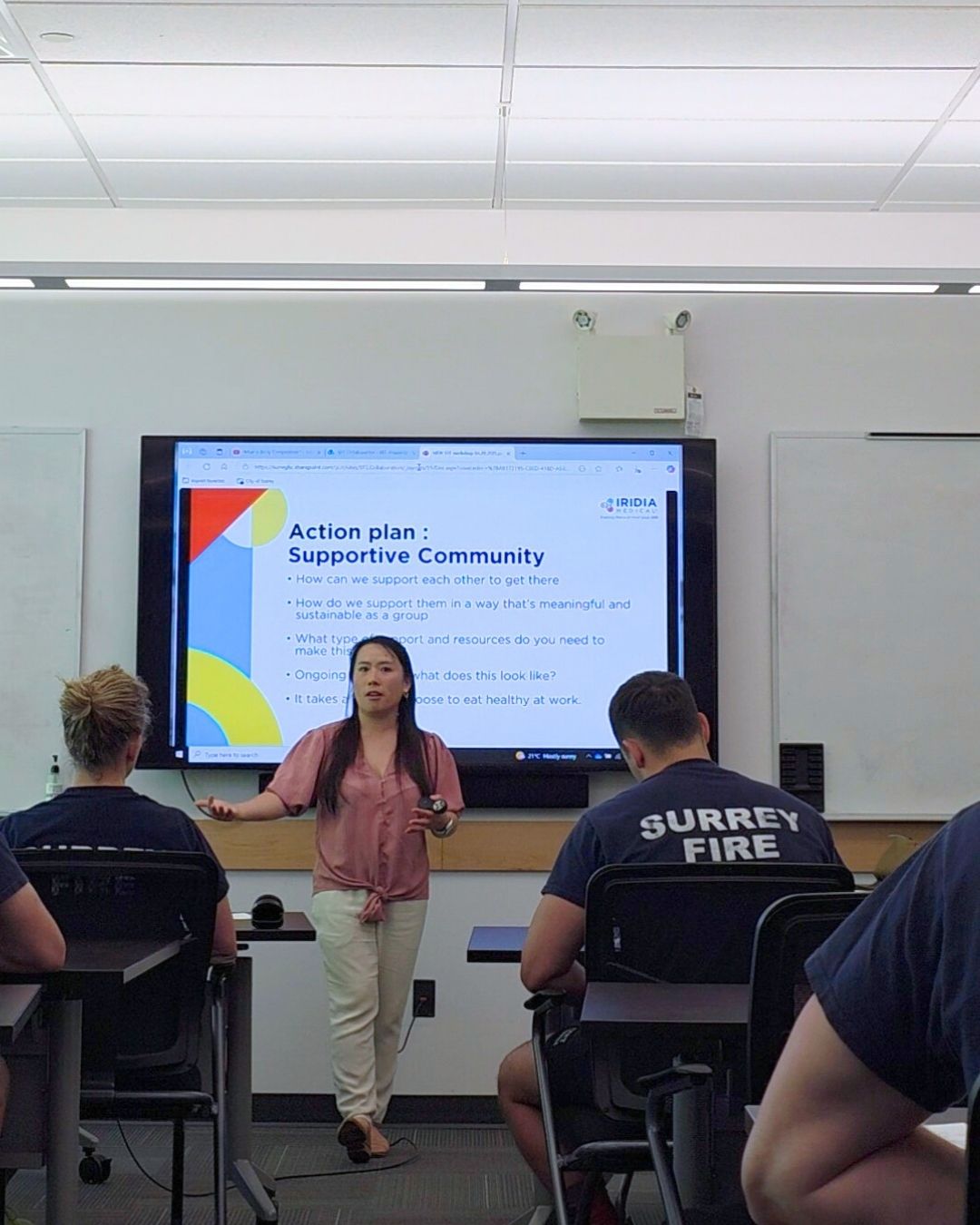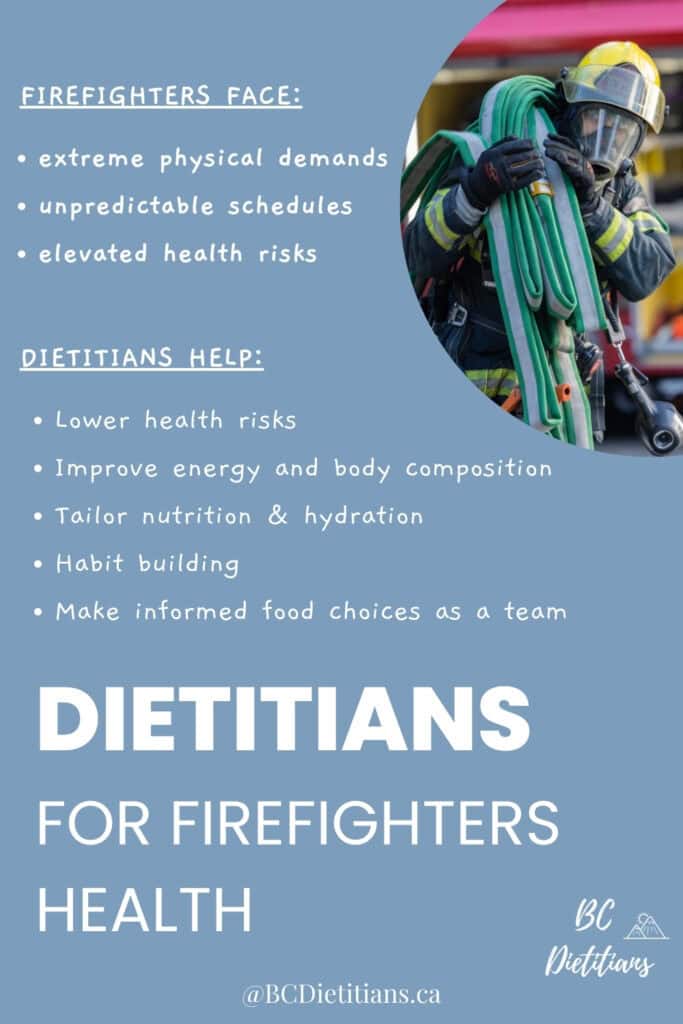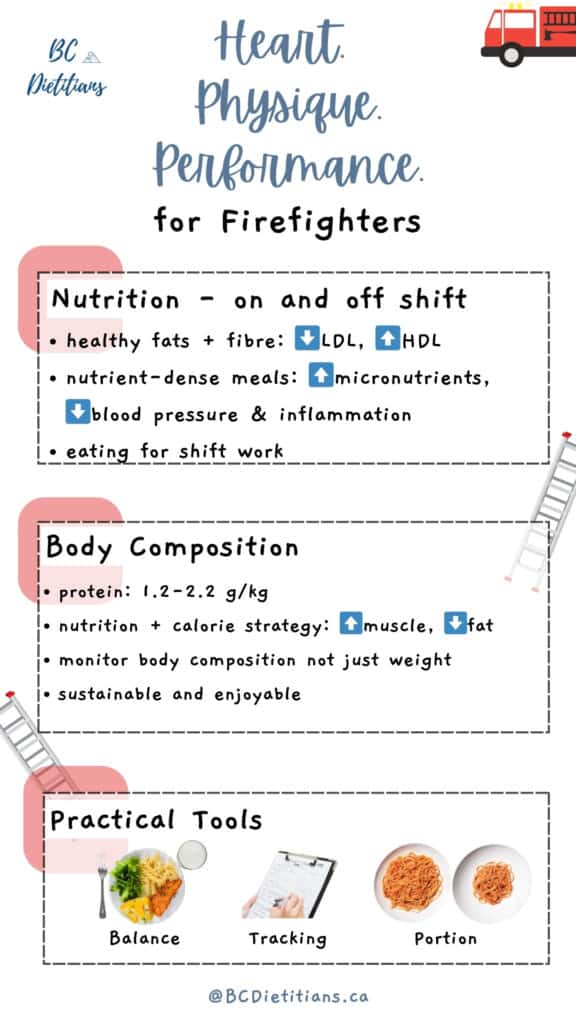Cardiovascular disease is the 2nd leading cause of death in Canada. Sudden cardiac events are the leading cause of duty-related deaths in the fire service.
The good news is that up to 80% of premature heart disease and stroke cases can be prevented through lifestyle changes.
It’s not just about how long you live, but how well you live.
No one eats perfectly all the time. But small, consistent changes add up. We can aim to make small changes one step at a time, and choose the right choices most of the time to optimize body composition and health.
Good nutrition helps you:
- Perform better on the job
- Protect your heart and reduce long-term disease risk
- Improve quality of life as you age
Don’t wait until your numbers are out of range. Be proactive, and start today.

Why Firefighters Are at Higher Health Risks
Firefighting is a high-stress, high-intensity job. The combination of physical strain, heat exposure, disrupted sleep, and long shifts puts firefighters at increased risk for heart issues, even more so than the general population.
We recently had the pleasure to speak with Surrey Firefighters about heart health and how nutrition plays a critical role in performance, recovery, and long-term health. From managing energy on shift to reducing the risk of heart disease, we covered practical strategies that support both the demands of the job and overall well-being.
It’s always inspiring to work with teams who are committed to taking care of their health, both on and off duty. We love working with companies investing in employee health and wellbeing.
If your department or workplace is looking for a hands-on, engaging way to learn about nutrition topics and cooking workshops, connect with us today.
BC dietitians help your local heroes feel and perform their best every day.

What is Cholesterol and Why Does it Matter?
Cholesterol is a waxy substance found naturally in the body. It’s essential for functions including building cell membrane structures, producing vitamins and hormones, and supporting brain and nerve function.
Your liver makes about 80% of it, and the rest comes from the diet. But when levels are too high, it increases your risk of heart disease.
Types of cholesterol and fats in the body:
- LDL (“bad” cholesterol) adds to plaque in the arteries; plaque buildup (atherosclerosis) increases the risk of heart attacks and strokes
- HDL (“good” cholesterol) helps remove cholesterol from the bloodstream
- Triglycerides are another type of fat in the blood that increases with poor diet and alcohol
- ApoB and Lipoprotein(a) are also markers that provide a more complete picture of heart disease risk
What are the main signs and symptoms of high cholesterol?
High cholesterol typically has no symptoms. High blood pressure, shortness of breath, or chest pain often show up after cholesterol has already caused harm.
That’s why knowing your numbers is important. If cholesterol is high, you can start making changes before it leads to plaque buildup, heart attacks, or strokes.
Cholesterol levels tend to rise with age. After age 20, LDL and total cholesterol increase more noticeably over time in both men and women. For women, cholesterol levels often rise sharply after menopause due to the drop in estrogen, which normally helps regulate cholesterol.
Most people don’t feel symptoms of high cholesterol until it’s too late. Routine screening is important, and early detection saves lives.
Don’t wait for symptoms or numbers to get out of range to take action.
Body Composition Over Body Weight
As we age, we tend to gain fat and lose muscle. A healthier muscle-to-fat ratio supports longevity, strength, energy, and health span. Having both high cholesterol and high visceral fat doubles your risk of heart attack or death
Tools we use in our workplace nutrition programs, such as the InBody scan, are reliable ways to help you monitor your body composition over time.
Focusing on body composition (how much muscle vs. fat you carry) is more useful than just watching the scale, and nutrition is the biggest driver for change.
Connect with a dietitian today and learn how you can take your health, energy, and performance to the next level.

Be Intentional About Your Nutrition
In our presentation, we talked about how poor nutrition contributes to high cholesterol, weight gain, and metabolic issues, and how the right choices can reduce those risks.
Daily protein needs – which vary based on your weight, activity level, and goals. We emphasized consuming a variety of protein sources and more plant-based proteins, and spreading your protein intake throughout the day to maintain muscle and support recovery.
Protein quality and variety – including why a mix of lean meats, fish, nuts, seeds, and plant proteins (like lentils and soy) supports heart health, lowers LDL cholesterol, and helps regulate appetite and blood sugar. We also discussed avoiding processed meats and limiting high-fat red meats.
Fibre and smart carbs – how soluble fibre (from oats, beans, psyllium, fruits) helps lower cholesterol, and why choosing whole grains, legumes, fruits, and vegetables matters more than cutting carbs.
Heart-healthy fats – the importance of replacing saturated and trans fats with monounsaturated and omega-3 fats, and keeping fat portions in check to avoid excess calories and inflammation.
Hydration – especially in high-heat or high-stress jobs like firefighting, where dehydration strains the heart and affects performance. We reviewed fluid replacement guidelines and the need for electrolytes during heavy sweating.
Want to incorporate these into your workplace? Connect with a dietitian today to learn about the services we offer.
Partnering for Health & Performance
Working with a dietitian can help you take a strategic, data-informed approach to eating that supports energy, strength, and long-term health.
A dietitian can help you in:
- Managing food portions using practical tools such as Canada’s Food Guide
- Making sure you’re getting enough fruits and vegetables, whole grains, and a mix of protein sources
- Using data such as food tracking to identify patterns, gaps, areas for improvement, and inform better choices
In this session, we also introduced a simple Start-Stop-Continue framework to help you take action:
- Start: What’s one healthy habit you can begin tomorrow?
- Stop: What’s one habit that’s holding you back?
- Continue: What’s already working that you want to keep doing?
Connect with BC Dietitians for Your Organization
Dietitians can help you build a plan that works for your life, job demands, and personal goals.
If you’re looking for guidance, tools, or resources, or want to bring nutrition workshops to your team, get in touch with us today. We’re here to support your health and performance for the long run.





Add a comment